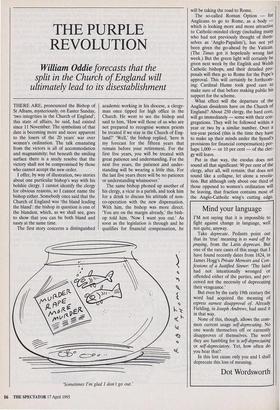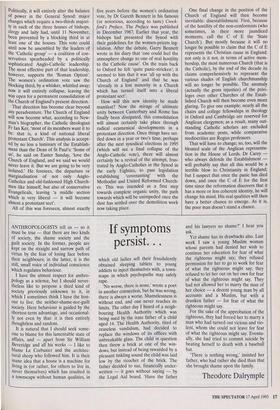THE PURPLE REVOLUTION
William Oddie forecasts that the
split in the Church of England will ultimately lead to its disestablishment
THERE ARE, pronounced the Bishop of St Albans, mysteriously, on Easter Sunday, `two integrities in the Church of England'; this state of affairs, he said, had existed since 11 November. The symbolism of that date is becoming more and more apparent to the losers of the 20 years' war over women's ordination. The talk emanating from the victors is all of accommodation and magnanimity; but beneath the smiling surface there is a steely resolve that the victory shall not be compromised by those who cannot accept the new order.
I offer, by way of illustration, two stories about one particular bishop's way with his bolshie clergy. I cannot identify the clergy for obvious reasons, so I cannot name the bishop either. Somebody once said that the Church of England was 'the bland leading the bland': the bishop in question is one of the blandest, which, as we shall see, goes to show that you can be both bland and nasty at the same time.
The first story concerns a distinguished academic working in his diocese, a clergy- man once tipped for high office in the Church. He went to see the bishop and said to him, 'How will those of us who are not prepared to recognise women priests be treated if we stay in the Church of Eng- land?' Well,' the bishop replied, 'here is my forecast for the fifteen years that remain before your retirement. For the first five years, you will be treated with great patience and understanding. For the next five years, the patience ,and under- standing will be wearing a little thin. For the last five years there will be no patience or understanding whatsoever.'
The same bishop phoned up another of his clergy, a vicar in a parish, and took him for a drink to discuss his attitude of non- co-operation with the new dispensation. With him, the bishop was more direct. `You are on the margin already,' the bish- op told him. 'Now I want you out.' As soon as the legislation is through and he qualifies for financial compensation, he `Sometimes I'm glad I don't go out.' will be taking the road to Rome.
The so-called Roman Option — for Anglicans to go to Rome, as a body which is looking more and more attractive to Catholic-minded clergy (including many who had not previously thought of them- selves as Anglo-Papalists), has not yet been given the go-ahead by the Vatican. (The Times got it hopelessly wrong last week.) But the green light will certainly be given next week by the English and Welsh Catholic bishops, and their detailed pro- posals will then go to Rome for the Pope's approval. This will certainly be forthcom- ing; Cardinal Hume took good care to make sure of that before making public his support for the scheme.
What effect will the departure of the Anglican dissidents have on the Church of England? About 250 clergy, the hard core, will go immediately — some with their con- gregations. They will be followed within a year or two by a similar number. Over a ten-year period (this is the time they have to make up their minds under the Synod's provisions for financial compensation) per- haps 1,000 — or 10 per cent — of the cler- gy will leave. Put in that way, the exodus does not sound all that significant: 90 per cent of the clergy, after all, will remain; that does not sound like a collapse, let alone a revolu- tion. But although only about one third of those opposed to women's ordination will be leaving, that fraction contains most of the Anglo-Catholic wing's cutting edge. Politically, it will entirely alter the balance of power in the General Synod: major changes which require a two-thirds majori- ty in each of the three houses of bishops, clergy and laity had, until 11 November, been prevented by a blocking third in at least one of the houses. This vote could until now be assembled by the leaders of the 'Catholic group' — a coalition of con- servatives spearheaded by a politically sophisticated Anglo-Catholic leadership. The most effective part of that leadership, however, supports the 'Roman Option'. The women's ordination vote saw the blocking third, by a whisker, whittled away; now it will entirely collapse, leaving the Way open for a permanent consolidation of the Church of England's present direction.
That direction has become clear beyond any peradventure. The Church of England will now become what, according to New- man's biographer, the Catholic theologian Fr Ian Ker, 'most of its members want it to be: that is, a kind of national liberal protestant Church'. This analysis is accept- ed by no less a luminary of the Establish- ment than the Dean of St Paul's: 'Some of us', he said on Easter Sunday, 'love the Church of England, and we said we would never leave it. But we are going to be very isolated.' He foresees, the departure or marginalisation of not only Anglo- Catholics and old-fashioned High Church- men like himself, but also of conservative Evangelicals, leaving 'a middle section which is very liberal — it will become almost a protestant sect'.
All of this was foreseen, almost exactly five years before the women's ordination vote, by Dr Gareth Bennett in his famous (or notorious, according to taste) Crock- ford's Preface. The Preface was published in December 1987. Earlier that year, the bishops had presented the Synod with their guidelines for the women-priests leg- islation. After the debate, Garry Bennett wrote in his diary that 'one could feel the atmosphere change to one of real hostility to the Catholic cause'. On the train back to Oxford he felt 'quite panic-stricken'; it seemed to him that it was 'all up with the Church of England' and that he was `already in a lost minority in a Church which has turned itself into a liberal protestant sect'.
How will this new identity be made manifest? Now the mirage of ultimate unity between Canterbury and Rome has finally been dissipated, this consolidation will almost certainly take place through radical ecumenical developments in a protestant direction. Once things have set- tled down in a year or two's time, perhaps after the next synodical elections in 1995 (which will see a final collapse of the Anglo-Catholic vote), there will almost certainly be a revival of the attempt, frus- trated by Anglo-Catholics in the Synod in the early Eighties, to pass legislation establishing 'covenanting' with the Methodist and United Reformed Church- es. This was intended as a first step towards complete organic unity, the path towards which will be unimpeded once the dust has settled over the demolition work now taking place. One final change in the position of the Church of England will then become inevitable: disestablishment. First, because of the hostility of the non-conformists (who sometimes, in their more jaundiced moments, call the C of E the 'State Church'). But mostly because it will no longer be possible to claim that the C of E represents the Christian cause in England: not only is it not, in terms of active mem- bership, the most numerous Church (that is the Catholic), by the end of the decade its claims comprehensively to represent the various shades of English churchmanship will no longer be possible. The anomaly (actually the gross injustice) of the privi- leges over other Churches of the Estab- lished Church will then become even more glaring. To give one example: nearly all the chairs and college fellowships in theology in Oxford and Cambridge are reserved for Anglican clergymen; as a result, many out- standing Catholic scholars are excluded from academic posts, while comparative mediocrities are Regius professors.
That will have to change; so, too, will the bloated scale of the Anglican representa- tion in the House of Lords. Dr Carey who always defends the Establishment will probably say that all this would be a terrible blow to Christianity in England; but I suspect that once the panic has died down, and once the C of E for the first time since the reformation discovers that it has a more or less coherent identity, he will change his mind. His real qualities will then have a better chance to emerge. As it is, the poor man doesn't stand a chance,



















































 Previous page
Previous page